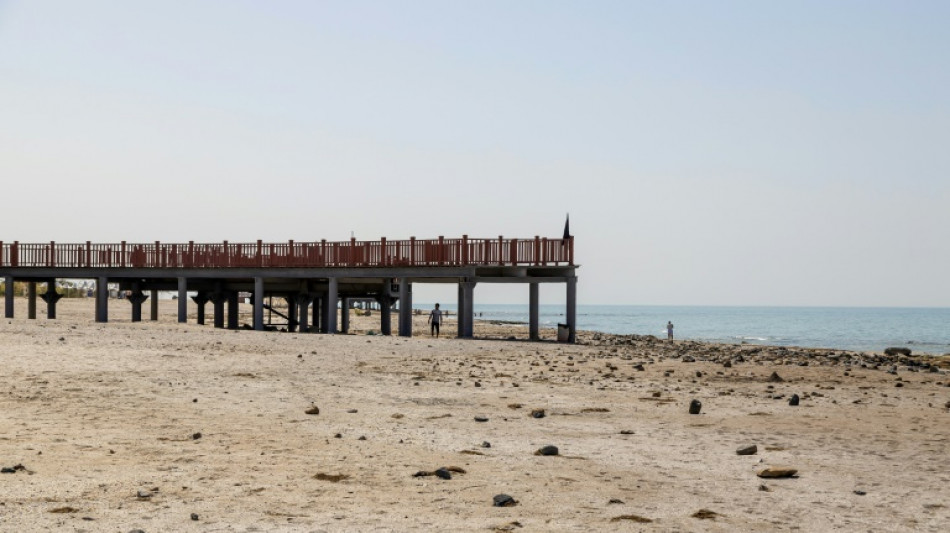
-
 Queen Camilla recalls fighting back against train attacker
Queen Camilla recalls fighting back against train attacker
-
Stocks drop at end of record year for markets

-
 Amorim still 'really confident' about Man Utd potential despite Wolves draw
Amorim still 'really confident' about Man Utd potential despite Wolves draw
-
Berlin says decision postponed on European fighter jet

-
 Iran prosecutor pledges 'decisive' response if protests destabilise country
Iran prosecutor pledges 'decisive' response if protests destabilise country
-
Emery defends failure to shake hands with Arteta after Villa loss to Arsenal

-
 China says to impose extra 55% tariffs on some beef imports
China says to impose extra 55% tariffs on some beef imports
-
Japanese women MPs want more seats, the porcelain kind

-
 Guinea junta chief Doumbouya elected president: election commission
Guinea junta chief Doumbouya elected president: election commission
-
Pistons pound Lakers as James marks 41st birthday with loss

-
 Taiwan coastguard says Chinese ships 'withdrawing' after drills
Taiwan coastguard says Chinese ships 'withdrawing' after drills
-
France's homeless wrap up to survive at freezing year's end

-
 Leftist Mamdani to take over as New York mayor under Trump shadow
Leftist Mamdani to take over as New York mayor under Trump shadow
-
French duo stripped of Sydney-Hobart race overall win

-
 Thailand releases 18 Cambodian soldiers held since July
Thailand releases 18 Cambodian soldiers held since July
-
Tiny tech, big AI power: what are 2-nanometre chips?

-
 Libyans savour shared heritage at reopened national museum
Libyans savour shared heritage at reopened national museum
-
Asia markets mixed in final day of 2025 trading

-
 Global 'fragmentation' fuelling world's crises: UN refugee chief
Global 'fragmentation' fuelling world's crises: UN refugee chief
-
Difficult dance: Cambodian tradition under threat

-
 Regional temperature records broken across the world in 2025
Regional temperature records broken across the world in 2025
-
'Sincaraz' set to dominate as 2026 tennis season kicks off

-
 Bulgaria readies to adopt the euro, nearly 20 years after joining EU
Bulgaria readies to adopt the euro, nearly 20 years after joining EU
-
Trump v 'Obamacare': US health costs set to soar for millions in 2026

-
 Isiah Whitlock Jr., 'The Wire' actor, dies at 71
Isiah Whitlock Jr., 'The Wire' actor, dies at 71
-
SoftBank lifts OpenAI stake to 11% with $41bln investment

-
 Bangladesh mourns ex-PM Khaleda Zia with state funeral
Bangladesh mourns ex-PM Khaleda Zia with state funeral
-
TSMC says started mass production of 'most advanced' 2nm chips

-
 Australian cricket great Damien Martyn 'in induced coma'
Australian cricket great Damien Martyn 'in induced coma'
-
Guinea junta chief Doumboya elected president: election commission

-
 Apex Provides Recap of 2025 Regional Exploration Drilling and Priority Follow Up Targets at the Cap Critical Minerals Project
Apex Provides Recap of 2025 Regional Exploration Drilling and Priority Follow Up Targets at the Cap Critical Minerals Project
-
Guardian Metal Resources PLC Announces Total Voting Rights

-
 Caballero defends Maresca after Palmer substitution sparks jeers
Caballero defends Maresca after Palmer substitution sparks jeers
-
Depleted Man Utd 'lack quality', says Amorim

-
 'We know what we want': Arteta eyes title after Arsenal thrash Villa
'We know what we want': Arteta eyes title after Arsenal thrash Villa
-
Arsenal crush Villa to make statement in title race

-
 Senegal top AFCON group ahead of DR Congo as Tanzania make history
Senegal top AFCON group ahead of DR Congo as Tanzania make history
-
Maresca in the firing line as Chelsea stumble against Bournemouth

-
 Senegal top AFCON group, DR Congo to face Algeria in last 16
Senegal top AFCON group, DR Congo to face Algeria in last 16
-
Norway's Magnus Carlsen wins 20th world chess title

-
 Patriots star Diggs facing assault charges: reports
Patriots star Diggs facing assault charges: reports
-
Journalist Tatiana Schlossberg, granddaughter of JFK, dies at 35

-
 Rio receives Guinness record for biggest New Year's bash
Rio receives Guinness record for biggest New Year's bash
-
Jokic out for four weeks after knee injury: Nuggets

-
 World bids farewell to 2025, a year of Trump, truces and turmoil
World bids farewell to 2025, a year of Trump, truces and turmoil
-
Far-right leader Le Pen to attend Brigitte Bardot's funeral

-
 Drones dive into aviation's deepest enigma as MH370 hunt restarts
Drones dive into aviation's deepest enigma as MH370 hunt restarts
-
German dog owners sit out New Year's Eve chaos in airport hotels

-
 Tanzania hold Tunisia to end 45-year wait for AFCON knockout spot
Tanzania hold Tunisia to end 45-year wait for AFCON knockout spot
-
10 countries warn of 'catastrophic' Gaza situation


Shrinking Caspian Sea worries secretive Turkmenistan
On the Caspian Sea coast in Turkmenistan -- one of the world's most secretive states -- Batyr Yusupov can no longer ferry his passengers between two ports. There is not enough water.
"I used to go between Turkmenbashi and Hazar," the 36-year-old ferry worker said of the ports separated by a small gulf on Turkmenistan's coast.
"But we haven't been able to go there for a year due to the serious shrinking of the Caspian," he said.
In at least one seaside city, local bathers have noted the waters receding by hundreds of metres.
But it is not just about ferry routes or having to walk further for a proper swim: the changes hit the heart of Turkmenistan's struggling economy.
And year after year, the water levels are falling.
It is still not entirely clear why that is happening, but scientists say it is down to naturally occurring processes exacerbated by climate change.
One 2021 study projected that by 2100, water levels in the Caspian Sea could drop by another 8 to 30 metres (26 to 98 feet).
The Caspian Sea, an inland body of water, is flanked by the Caucasus region to the west and Central Asia to the east.
Turkmenistan, a former Soviet republic, is one of five countries on the Caspian Sea together with Azerbaijan, Kazakhstan, Iran and Russia.
And they are all, to some extent or another, affected by the changes.
- Receding shoreline -
South of Turkmenbashi, in the seaside town of Hazar, satellite images show the shore has receded around 800 metres (half a mile) on both sides.
That has turned the town, which sits at the end of a peninsula, into an island.
Instead of sailing between Hazar and the main port of Turkmenbashi, Yusupov now takes passengers to Gyzylsuw -- between the two -- which is more accessible by boat.
But even there, the situation is not much better.
"A new pier is being built because the old one is no longer deep enough," said one local resident, 40-year-old Aisha.
Dozens of rusty boats line the shore in Gyzylsuw.
Aisha's house has stilts protecting it from the sea, which now seem superfluous.
"Even during storms, the water doesn't reach the house," she said.
In Turkmenbashi itself, Turkmenistan's largest coastal city, the changing shoreline is evident to swimmers.
"Last summer, the water was up to my shoulders, then around my waist," said one regular, 35-year-old Lyudmila Yesenova.
"This year, it's below my knees."
- Sounding the alarm -
The receding waters threaten the maritime infrastructure of Turkmenbashi, a major Central Asia port crucial for trade between Europe and Asia.
And on the opposite coast of the Caspian lies Baku, the capital of oil-rich Azerbaijan.
Turkmen Foreign Minister Rashid Meredov sounded the alarm in a recent speech.
"At present, the sea level is close to the minimum values for the entire time of instrumental observations," he said in August.
"In the last 25 years, it has decreased by almost two metres," which meant that the retreat of the sea had become particularly noticeable in recent years, he added.
"The sea has moved hundreds of metres away from its former shores," he said. "In the north of the Caspian these figures are even higher."
Neighbouring Kazakhstan, Central Asia's largest country, has echoed some of Turkmenistan's concerns.
But after years of disputes over the control of huge hydrocarbon reserves in the region, the collaboration Meredov has called for is only in its earliest stages.
- 'Tectonic movements' -
Turkmen scientist Nazar Muradov attributes the changing sea levels to "tectonic movements and seismic phenomena, which change the seabed".
He said the sea level had previously fallen in the 1930s and the 1980s before rising again. But the changing climate also had to be factored into this latest phenomenon, he added.
"The sea level also depends on the flow of rivers -- whose levels are diminishing -- as well as low levels of precipitation and intense evaporation."
Kazakhstan also depends on the sea for its oil and gas industry.
The drop in water levels, coupled with a rise in temperatures, has also hit marine life in the Caspian, including seals.
In a sign he is taking the situation seriously, Kazakh leader Kassym-Jomart Tokayev has announced he had taken the decline in the seal population under his "personal control".
He also said Kazakhstan would create a research institute for the study of the Caspian.
Th.Berger--AMWN

